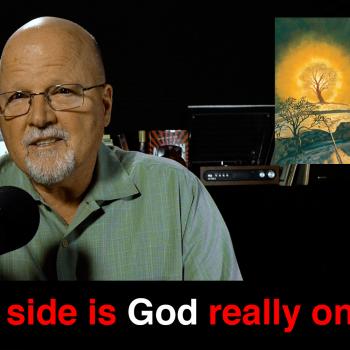
“Jesus said…”
As you are about to hear in this PODCAST, the fact of the matter is this: Jesus said seven statements, this as His life was literally dripping out of Him drop by precious drop. Each one of the seven — when considered separately — tells a most-dramatic tale. All of the seven — when considered collectively — give us an unparalleled insight into the heart of Jesus.
It was, after all, Jesus who much earlier in His ministry said this: “For whatever is in your heart determines what you say” (Matthew 12).
On yet another occasion, Luke 6, Jesus said, “What you say flows from what is in your heart.”
So if we want to know what is in Jesus’ heart, we need look no further than what Jesus said. His words.
And as we are about to learn, what Jesus said from the cross, in the closing moments of His storied life, reveals perhaps most clearly of all exactly what was in His sizable heart. What a beautiful heart His was and is.
So join me now at the foot of the cross as we hear for ourselves the final words of Jesus as His innocent and holy life comes to a violently calamitous close.
We read the first of Jesus’ parting words in Luke 23:33-34,
When they came to a place called The Skull, they nailed him to the cross. And the criminals were also crucified—one on his right and one on his left. Jesus said “Father, forgive them, for they don’t know what they are doing.”
The prophet Isaiah actually prophesied this moment some 700 years earlier in Isaiah 53:12,
…he exposed himself to death.
He was counted among the rebels.
He bore the sins of many and prayed that they might be forgiven.
One thing that is abundantly clear here, and throughout Scripture is this undeniable fact: It is the very nature of God to forgive.
If we truly believed this, then we would be so much more able to lead effective Christian lives because by coming to terms with the fact that God’s nature is to forgive, we would be able to forgive ourselves! Satan is called The Accuser of our Brethren for good reason – he won’t let us ever forget all the stuff we have done that make us ashamed. Yet, when we repent, we are actually and completely forgiven, thanks to God’s great love! He will never reject our repentant hearts.
And the same is and was true for His only begotten Son… even on the cross.
But, to fully grasp what Jesus was praying for, let’s look at the context of that moment, starting way back in Matthew 12:14,
Then the Pharisees called a meeting to plot how to kill Jesus.
Then, we read in Mark 3:6,
the Pharisees went away and met with the supporters of Herod to plot how to kill Jesus.
And, in Luke 4:28-29, as Jesus was visiting His boyhood home of Nazareth, we read even more details about what the Pharisees needed forgiveness for, as they didn’t know what they were doing…
the people in the synagogue were furious. 29 Jumping up, they mobbed him and forced him to the edge of the hill on which the town was built. They intended to push him over the cliff
Then, in Luke 13:31, we read of some friendly Pharisees warning Jesus,
“Get away from here if you want to live! Herod Antipas wants to kill you!”
And, in John 8:58-59, we read this exchange between Jesus and the religious leaders:
“Very truly I tell you,” Jesus answered, “before Abraham was born, I am!” 59 At this, they picked up stones to stone him, but Jesus hid himself, slipping away from the temple grounds.
There was Jesus, in His Father’s house, having to slip away undercover and go into hiding because the Jewish leaders wanted to kill Him on the spot! But they wouldn’t stop…
Once again the people picked up stones to kill him. 32 Jesus said, “At my Father’s direction I have done many good works. For which one are you going to stone me?” (John 10:31-32)
And, in the following chapter, we read the continuation of the Pharisees’ pursuit of Jesus, chasing Him out of the Great City…
So from that time on, the Jewish leaders began to plot Jesus’ death. 54 As a result, Jesus stopped his public ministry among the people and left Jerusalem. He went to a place near the wilderness, to the village of Ephraim, and stayed there with his disciples.
The point is, there were plots and plans laid out and initiated by the Jewish religious leaders, the Roman political leaders, committees and conspirators all with the aim of ambushing Jesus, arresting Him and killing Him throughout nearly His entire ministry, culminating to that terrible day we now call “Good Friday” when this happened while Jesus was being shuffled from one illegal trial to another:
Then the men who held Jesus made a great game of knocking him about. And they blindfolded him and asked him, “Now prophet, guess who hit you that time!” And that was only the beginning of the way they insulted him. (Luke 22:63-65)
Later that morning, we read what happened when Jesus was brought before Herod in Luke 23:11,
Then Herod and his soldiers began mocking and ridiculing Jesus.
Soon after Herod dismissed Him, we read what happened while Jesus was under Pilate’s watch,
Then Pilate, the Roman Governor of Judea, had Jesus flogged with a lead tipped whip. (John 19:1)
John didn’t need to go into detail of what Jesus endured at this moment, as he knew his readers were far too familiar with the brutality of a Roman flogging. But, the mocking and torture didn’t end there.
They stripped him and put a scarlet robe on him. 29 They wove thorn branches into a crown and put it on his head, and they placed a reed stick in his right hand as a scepter. Then they knelt before him in mockery and taunted, “Hail! King of the Jews!” 30 And they spit on him and grabbed the stick and struck him on the head with it. (Matthew 27:28-30)
Then Pilate turned Jesus over to them to be crucified. So they took Jesus away. 17 Carrying the cross by himself, he went to the place called Place of the Skull (in Hebrew, Golgotha). 18 There they nailed him to the cross. (John 19:16-18)
All that is the context within which Jesus hung there, praying to His Father, “Forgive them for they don’t know what they are doing.” After all that – years of trying to kill Him – Jesus still prayed that God would forgive them.
It is, and ever shall be, the heart of God to forgive. And this means to forgive YOU.
Never forget that in God’s kingdom, repentance is the “coin of the realm”.
So, all this begs a very important question: Did God, the Father, answer Jesus’ prayer and forgive all of those responsible for all of His torture and death?
Before answering this question, consider this: Jesus was not Biblically required to pray for the forgiveness of His tormentors, nor His executioners. In fact, previously, some very Godly men who endured far less than Jesus endured, did not pray for God to forgive their tormentors, but actually prayed for His wrath and vengeance against them. In fact, there is an entire genre of Psalms, referred to as Imprecatory Psalms, that invoke judgment, calamity, or curses, upon the writer’s enemies or perceived enemies of God. Notable examples are Psalms 2, 5, 6, 11, 12, 35, 37, 40, 52, 54, 55, 58, 59, 69, 79, 83, 109, 137, 139, and 143. Obviously, this is not a short list, nor a slight blip on the Biblical radar.
Consider King David’s prayer in Psalm 69:22-
Let the bountiful table set before them become a snare
and their prosperity become a trap.
23 Let their eyes go blind so they cannot see,
and make their bodies shake continually.
24 Pour out your fury on them;
consume them with your burning anger.
25 Let their homes become desolate
and their tents be deserted.
26 To the one you have punished, they add insult to injury;
they add to the pain of those you have hurt.
27 Pile their sins up high,
and don’t let them go free.
28 Erase their names from the Book of Life;
don’t let them be counted among the righteous.
That’s David’s – the “man after God’s own heart” – prayer regarding his enemies.
And these Imprecatory prayers are not isolated to the Psalms. Jeremiah, one of the Godliest men to ever walk the earth prayed:
“Lord, you know what’s happening to me.
Please step in and help me. Punish my persecutors! (Jeremiah 15:15)
Jeremiah also prayed these words in regards to his tormentors:
Lord, you know all about their murderous plots against me.
Don’t forgive their crimes and blot out their sins.
Let them die before you.
Deal with them in your anger. (Jeremiah 18:23)
You may be thinking, “yeah, but, these are isolated cases within the Old Testament.” Let’s consider what Paul wrote in his letter to the Galatians:
Let God’s curse fall on anyone, including us or even an angel from heaven, who preaches a different kind of Good News than the one we preached to you. 9 I say again what we have said before: If anyone preaches any other Good News than the one you welcomed, let that person be cursed. (Galatians 1:8-9)
And know this… nowhere did God rebuke these or any other equally Godly men for their equally imprecatory prayers.
Yet, while Jeremiah, David and other very Godly men set examples for us to perhaps follow, Jesus did not follow their examples at all. Because, while Jesus was fully human, He is also fully God. And in this moment, in regards to this portion of His nature, He is nothing like us at all. It is in His nature to forgive!
That is amazing to me!
That is who He is, and it is what God does… again and again and again. He forgives in response to our repentance. So, if God can forgive those who tormented, beat and killed His only Son, then He can and most assuredly will forgive you and me.
Still, some might argue that when Jesus said, “Father forgive THEM for THEY don’t know what THEY are doing”, He was recognizing that while THEY were sinning, they were sinning in ignorance. They didn’t know any better. You and I, however, do not sin in ignorance. And because we sin with our eyes wide open, we are beyond Jesus’ prayer upon the cross.
I can’t put it any more clearly than RCH Lenski wrote:
“The sinning that is connected with the Passion of Jesus is so open, flagrant, deliberate, and so multiplied that everybody who was involved knew it. It is unwarranted to claim ignorance for these outrageous sins, or to think that Jesus supposed that ignorance was back of them. ‘What they are doing’ is defined in I Corinthians 2:8, namely this that they were crucifying the Lord of glory, or Acts 13:27, that they were fulfilling the prophets, or Acts 3:15-17, that they were killing the Prince of Life. It was this ignorance that Jesus referred to.”
Paul, who identified himself in present tense (not past tense) as the “chief of sinners… all to human, a slave to sin”, wrote this:
What shall we say about such wonderful things as these? If God is for us, who can ever be against us? 32 Since he did not spare even his own Son but gave him up for us all, won’t he also give us everything else? 33 Who dares accuse us whom God has chosen for his own? No one—for God himself has given us right standing with himself. 34 Who then will condemn us? No one—for Christ Jesus died for us and was raised to life for us, and he is sitting in the place of honor at God’s right hand, pleading for us. (Romans 8:31-34)
God is not against you! He is for you! He is your number one cheerleader! He hasn’t held back anything, but even surrendered His own Son for all of us! And Jesus, God’s risen Son still pleads for us today… He pleads that God would forgive us!
Can anything ever separate us from Christ’s love? Does it mean he no longer loves us if we have trouble or calamity, or are persecuted, or hungry, or destitute, or in danger, or threatened with death? 36 (As the Scriptures say, “For your sake we are killed every day; we are being slaughtered like sheep.”) 37 No, despite all these things, overwhelming victory is ours through Christ, who loved us.
38 And I am convinced that nothing can ever separate us from God’s love. Neither death nor life, neither angels nor demons, neither our fears for today nor our worries about tomorrow—not even the powers of hell can separate us from God’s love. 39 No power in the sky above or in the earth below—indeed, nothing in all creation will ever be able to separate us from the love of God that is revealed in Christ Jesus our Lord. (Romans 35-39)
If God can forgive Paul, who broke into homes and dragged fathers and husbands to be chained and thrown into prison for simply following Jesus. He even, on occasion, oversaw their executions, for the crime of being a Christ follower. If God can forgive Paul, He certainly can forgive you and me! And if Paul can be that certain, so can we!
We should cling to Paul’s words as inspiration and guiding principle:
Forgetting the past and looking forward to what lies ahead, 14 I press on to reach the end of the race and receive the heavenly prize for which God, through Christ Jesus, is calling us. (Philippians 3:13-14)
In other words, Paul reached a point in his life where he realized that it was time to move on and not live in the past any longer. Because God is a God, first and foremost, of forgiveness in response to our repentance.
So, back to my earlier question: Did God answer Jesus’ prayer and forgive all those people who tormented and killed Him?
Well, we read in Acts 2, some 50 days after Jesus’ crucifixion, Peter – the one who denied Jesus – stood up with thousands of Jewish pilgrims standing around him and said,
“So let everyone in Israel know for certain that God has made this Jesus, whom you crucified, to be both Lord and Messiah!”
37 Peter’s words pierced their hearts, and they said to him and to the other apostles, “Brothers, what should we do?”
38 Peter replied, “Each of you must repent of your sins and turn to God, and be baptized in the name of Jesus Christ for the forgiveness of your sins. Then you will receive the gift of the Holy Spirit. 39 This promise is to you, to your children, and to those far away — all who have been called by the Lord our God.” 40 Then Peter continued preaching for a long time, strongly urging all his listeners, “Save yourselves from this crooked generation!”
41 Those who believed what Peter said were baptized and added to the church that day —about 3,000 in all. (Acts 2:36-41)
That… all that in answer to Jesus’ prayer.
In God’s Kingdom, repentance is the coin of the realm!
Then, just two chapters later, we read how the number of Christians nearly doubled in just a short time:
many of the people who heard their message believed it, so the number of men who believed now totaled about 5,000. (Acts 4:4)
And, in Acts 6:7, we learn that this happened in Jerusalem:
So God’s message continued to spread. The number of believers greatly increased in Jerusalem, and many of the Jewish priests were converted, too.
These are the people who belonged to the group who conspired to kill Jesus. Not long after His resurrection, they had become Christ-followers along with the thousands of others in Jerusalem!
All this was a direct answer to Jesus’ prayer on the cross.
But, what about the Romans who crucified Him?
I can’t speak for all of them, but the Bible does speak for some of them, particularly the ones who were at the foot of the cross… the ones who drove the nails into his hands and ankles:
The Roman officer and the other soldiers at the crucifixion were terrified by the earthquake and all that had happened. They said, “This man truly was the Son of God!” (Matthew 27:54)
They thought they were killing a criminal, then they realized that they had killed the Son of God. That’s repentance.
Then there were the criminals who were crucified alongside Jesus:
One of the criminals hanging beside him scoffed, “So you’re the Messiah, are you? Prove it by saving yourself—and us, too, while you’re at it!”
40 But the other criminal protested, “Don’t you fear God even when you have been sentenced to die? 41 We deserve to die for our crimes, but this man hasn’t done anything wrong.” 42 Then he said, “Jesus, remember me when you come into your Kingdom.” (Luke 23:39-42)
A criminal who saw the error of his ways and asked to be remembered by Jesus in HIS kingdom. That’s repentance.
Which brings us to Jesus’ second statement while on the cross. It comes as Jesus’ answer to the thief on the cross:
43 And Jesus replied, “I assure you, today you will be with me in paradise.” (Luke 23:43)
It is the heart of God to forgive.
It is His very nature.
As Psalm 51:17 tells us,
A broken and repentant heart, God will always forgive and will never reject.













